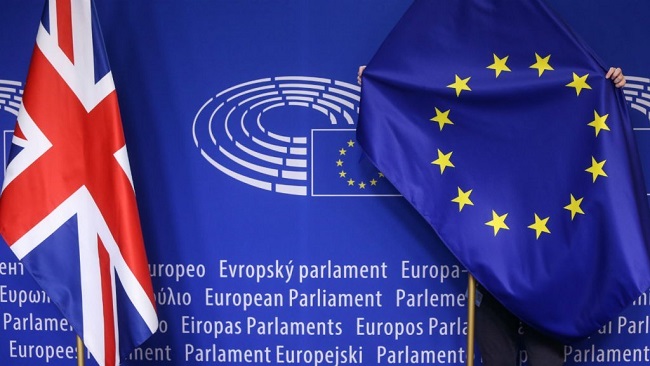European Union parliamentary elections and the Brexit headache
With the Brexit deadline delayed until autumn, Britain will still be an EU member when elections for the EU Parliament begin May 23 and thus obligated to elect its own MEPs. It is a confusing state of affairs that puts Europe in an “absurd” position.
Just a few weeks ago, the prospect of the UK taking part in the upcoming European elections seemed impossible. But that was before British Prime Minister Theresa May negotiated an additional six-month Brexit extension to give her a chance to get her divorce deal through the UK parliament – leaving the UK a full EU member when polls open next month and thus required to put forward parliamentary candidates.
“There’s still a slight chance that the British parliament votes on a Brexit deal before May 22 [the eve of the elections], which means they won’t have to hold EU elections. But that’s no longer likely,” Thierry Chopin, a professor in political science at Lille Catholic University, told FRANCE 24.
In June last year, the European Council adopted a new reform aimed at adapting the EU parliament to life after Brexit, abolishing 46 of the UK’s 73 European parliamentary seats – the remaining seats would be redistributed among the EU states that feel underrepresented in Brussels. France and Spain would be the big winners under the new reform, with five extra MEPs each, while Italy and the Netherlands would get three and Ireland two. Nine other member states would get one each.
“The European Council decision made in June 2018 is clear: It stipulates that if the United Kingdom has not left the European Union by the time of the European elections then it has to participate. If there’s no Brexit, there will be 751 MEPs on the election list, just like there are today,” a European parliament spokeswoman told FRANCE 24.
So what happens after the elections? “If the United Kingdom leaves, the European Council decision stands and the number of MEPs will be reduced to 705. Some of the British seats will then be redistributed,” she said. “The new MEPs will be those who were next in line on the waiting lists.”
Compulsory, grotesque and absurd
Some find the situation distasteful despite the legal requirements.
That a country wanting to leave the EU would be required to participate in European elections is “grotesque”, said Sabine Saurugger, a political science professor at Sciences Po university in Grenoble who specialises in EU institutions.
“Legally, it’s compulsory,” said Chopin. “The United Kingdom is a member state that holds full rights, and so it has to be represented at the heart of EU institutions. But politically, it’s absurd.”
“The Brits know that they’re going to leave during the [MEPs’] mandate … Or not. We’re not certain of anything anymore when it comes to Brexit,” he said. “This is why it’s so necessary for the United Kingdom to have elected representatives in place – in the case that an exit drags out into eternity.”
In France, many parties are frustrated at the prospect of Britain occupying the parliamentary seats in Brussels for yet another term.
“We very much regret the United Kingdom’s exit, but the voters have made their choice and now the Brits have to leave. They have already slowed down the European construction process and they have to stop slowing us down even more through this long-lasting departure,” France’s EELV green party said, adding: “The situation is unrealistic. To be a member of parliament is to work in the general interest of European construction, and it’s incompatible with an imminent exit.”
But the greens are hardly the only ones moaning about the UK’s election participation. Jordan Bardella, who tops the election list for France’s far-right National Rally party (formerly the National Front), said that: “It’s a bit ridiculous that the United Kingdom participates in the European elections if it’s only going to leave in a few months from now anyway.”
Jean-Louis Bourlanges, a seasoned MEP representing the MoDem (Mouvement Démocrate) party and part of President Emmanuel Macron’s parliamentary majority, simply described the UK’s new Brexit deadline as “extravagant” – not least because Brexiteers have vowed to “wreak havoc” if they get the opportunity to send MEPs to Brussels.
A poll published by YouGov on Wednesday showed that the UK’s Brexit Party, led by Eurosceptic Nigel Farage, would top the UK vote with 27 percent should Britain hold European elections next month.
‘Strange situation’
“It’s a strange situation for the United Kingdom,” Sciences Po’s Saurugger said. “We’re juggling three different things at the same time: We’re continuing to look for an exit deal through negotiations between Labour and the Tories, we’re preparing for the possibility of a no-deal Brexit, and at the same time we’re preparing for the EU elections.”
“Nevertheless, the elections are still being taken very seriously, [and] we’ve seen the establishment of two new parties,” she said, referring to Farage’s Brexit Party as well as Change UK (formerly The Independent Group), a party made up of former Labour and Tory supporters who want to prevent a Brexit by holding a second referendum on the issue.
Simon Usherwood, a political science professor at the University of Surrey, said the European elections have been presented in the UK as a “referendum by proxy” of sorts, with the EU once again unwittingly becoming a pawn in the game of domestic UK politics – the same game that produced Brexit in the first place.
France 24





